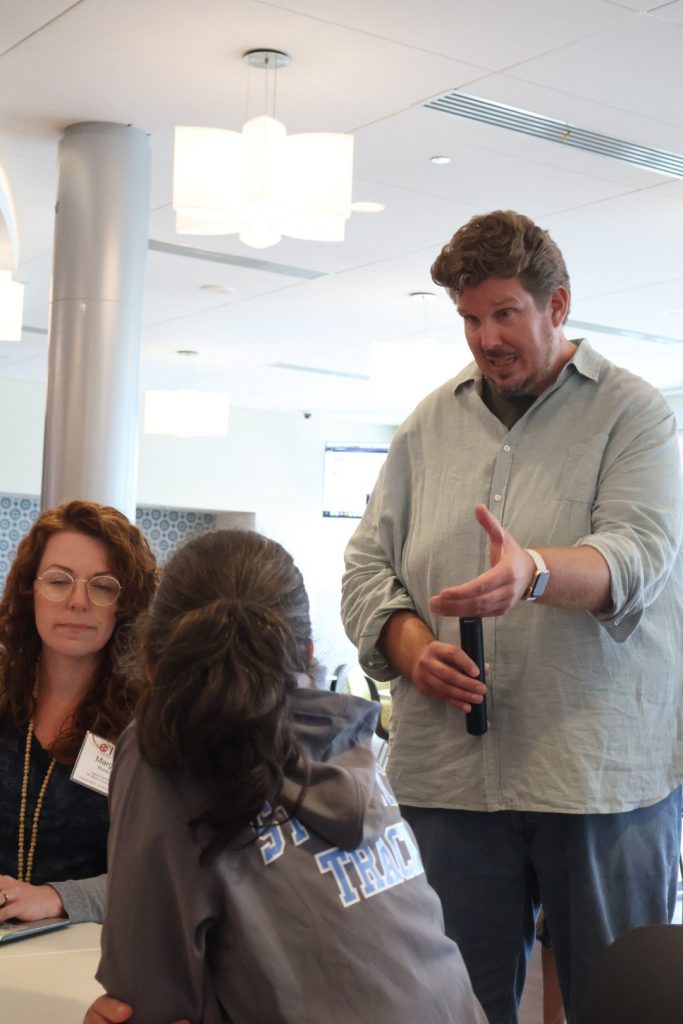
University of Mississippi faculty members Stephen Monroe (left), Marc Watkins and Guy Krueger are helping train K-12 teachers in the use and challenges of artificial intelligence in the classroom. Submitted photo
More than 80 Tennessee educators train with writing and rhetoric faculty
By Erin Garrett
What began as an effort to advise University of Mississippi writing faculty on artificial intelligence use in the classroom has expanded to reach regional K-12 teachers this fall.
Founded in spring 2023 by faculty members in the UM Department of Writing and Rhetoric, the Mississippi AI Institute launched a two-day seminar in June of that year for 23 campus faculty members with the goal of helping them incorporate generative AI in their classrooms.
Since, interest has grown exponentially, and the institute has trained more than 90 faculty members at the university.
“We now do this as much as we can for faculty across the entire university and we’re now offering it to teachers in a number of K-12 schools in our area,” said Marc Watkins, institute director and lecturer in writing and rhetoric.
This July, Watkins, Stephen Monroe, writing and rhetoric chair, and Guy Krueger, writing and rhetoric assistant chair, traveled to St. Mary’s Episcopal School in Memphis to give a full-day version of the AI workshop. More than 80 faculty from several schools in the Tennessee Association of Independent Schools attended.

“Marc and Stephen’s insight on the practical applications—and pratfalls—of AI were informative, engaging, and helpful in supporting our teacher’s professional development,” said Lauren Rogers, head of upper school at St. Mary’s. “Many of them are interested in having them return to campus again for more conversation and training.”
Beverly Brooks, St. Mary’s director of college counseling, said she is “frequently in conversation” with students, families, and college partners about generative AI and where it belongs in their process.
“The TAIS-Ole Miss program gave me direction in ensuring that our students and families feel comfortable and confident using AI responsibly as they enter the college application process and beyond,” she said. “I found the resources useful and the insight invaluable.”
Besides conversing with an AI avatar and generating original songs, the group created lesson plans and reading lists based on students’ interests with AI, and debated the ethical challenges created by the technology.
A quarter of American teachers say AI tools do more harm than good in K-12 education, according to a Pew Research Center poll. This underscores the need for comprehensive AI literacy training for educators.
Watkins, who also serves as assistant director of academic innovation at the university, said the institute’s top priority is to help teachers understand both the possibilities and implications of AI.
“These tools are advertised to save time, but we want them to do more than save time,” he said. “We invite them to explore ways AI can help students with their learning outcomes.
“However, we also explore how they could hinder them and give them practical advice on how curb AI abuse and misuse in the classroom.”
The team is slated to offer a full-day version of the institute for the Collierville, Tennessee, school district on November 5.
Monroe thanked the “innovative faculty” in writing and rhetoric for their contributions to elevating the university’s expertise in this area.
“The University of Mississippi has become a national leader in the emerging field of applied artificial intelligence,” he said. “We are using this expertise to help UM students build AI literacy. We are also sharing lessons with university and K-12 teachers around the country.
“During this era of dizzying technological change, educators must collaborate and support each other. We are all in this together.”



